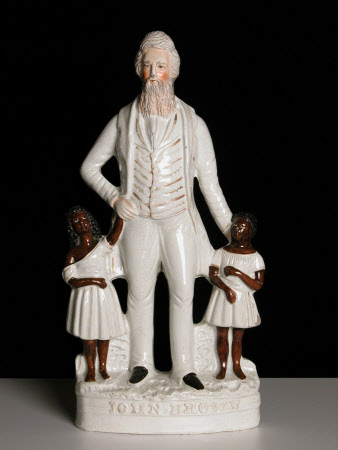John Brown
Category
Ceramics
Date
c. 1863
Materials
Lead-glazed earthenware (creamware) with overglaze enamel colours
Measurements
350 mm (H)
Place of origin
Staffordshire
Order this imageCollection
Attingham Park, Shropshire
NT 341683
Summary
Figure group of 'John Brown', moulded and lead-glazed earthenware, painted with enamel colours, made in Staffordshire, about 1863. Full-length figure of tall man wearing a long white jacket, shirt, waistcoat and trousers, with black shoes; standing between two children, holding the hand of one child to his right and resting his and on the back of the other child to his left; both children in white dresses and barefoot. The group on a titled base with raised capitals, 'JOHN BROWN'. The Industrial Revolution in early 19th-century Britain resulted in a new middle class equipped with the money and time to decorate their homes. They began adorning their domestic interiors with affordable, English earthenware pottery, much in the way their wealthier, 18th-century predecessors had done with Meissen or Chelsea porcelain. Staffordshire figures were made to commemorate heroes, villains and other figures of popular culture, not only from Britain but also the United States. The subject of American slavery found expression in the following Staffordshire figures: the fictional characters of Uncle Tom, Aunt Chloe, Eva and Topsy from from the anti-slavery novel Uncle Tom’s Cabin by the American author Harriet Beecher Stowe; the figure of Abraham Lincoln as presidential 'Liberator' of enslaved peoples; and as seen here, the Abolitonist figure of John Brown. Brown advocated for armed insurrection against slavery and led an anti-slavery raid at Harpers Ferry, Virginia in 1859. He was subsequently executed by hanging.
Provenance
Part of collection built up by Thomas Balston (d.1967).
Marks and inscriptions
On the front of the base: JOHN BROWN
